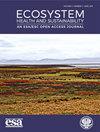创建可实现和有效的2020年后全球生物多样性框架的挑战和可能的解决方案
IF 3.4
2区 环境科学与生态学
Q1 ECOLOGY
引用次数: 5
摘要
由于人类活动,全球生物多样性正处于危机之中。这种生物多样性危机已经被科学家充分记录下来,得到了世界领导人、政治家、企业和公民的认可。生物多样性和气候危机现在都需要解决。2020年是这一变化的开始,生物多样性公约第15次缔约方大会(COP15)在昆明召开,联合国气候变化框架公约第26次缔约方大会(COP26)在格拉斯哥召开,但两次会议都被推迟了。COP26晚了一年(2021年11月)举行,而COP15分为两个部分,第一部分于2021年10月在昆明举行,第二部分定于2022年12月在蒙特利尔举行。这次在蒙特利尔举行的会议——可以说是cbd历史上最重要的会议——必须就2020年后全球生物多样性框架(GBF)达成一致,以扭转生物多样性的丧失。未能在蒙特利尔达成协议最终将是我们所有人的失败,对地球上的生命造成不可逆转的后果。然而,在最后期限前三个月,只有20%的文本和两个目标达成一致。本文回顾了阻碍协议进展的因素,并提出了可能的解决方案。本文章由计算机程序翻译,如有差异,请以英文原文为准。
Challenges and possible solutions to creating an achievable and effective Post-2020 Global Biodiversity Framework
ABSTRACT Global biodiversity is in crisis as a result of human activity. This biodiversity crisis has been well documented by scientists, recognized by world leaders, politicians, businesses, and citizens. Both the biodiversity and climate crises need to be addressed now. 2020 was when this change was supposed to start, with the 15th Conference of Parties (COP15) of the Convention on Biodiversity (CBD) meeting in Kunming, and the 26th Conference of Parties (COP26) of the UN Framework Convention on Climate Change meeting in Glasgow, but both meetings were postponed. COP26 was held a year late (November 2021), while COP15 was split into two, with the first part held in Kunming in October 2021, and the second part scheduled for Montreal in December 2022. This meeting in Montreal – arguably the most important in the CBDs history – must agree on the Post-2020 Global Biodiversity Framework (GBF), to reverse biodiversity loss. Failure to reach agreement in Montreal would ultimately be a failure of us all, with irreversible consequences for life on earth. Yet, with three months before the final deadline only 20% of text and two targets are agreed. This paper reviews the factors hindering progress on the agreement and suggests possible solutions.
求助全文
通过发布文献求助,成功后即可免费获取论文全文。
去求助
来源期刊

Ecosystem Health and Sustainability
Environmental Science-Management, Monitoring, Policy and Law
CiteScore
7.10
自引率
2.00%
发文量
40
审稿时长
22 weeks
期刊介绍:
Ecosystem Health and Sustainability publishes articles on advances in ecology and sustainability science, how global environmental change affects ecosystem health, how changes in human activities affect ecosystem conditions, and system-based approaches for applying ecological science in decision-making to promote sustainable development. Papers focus on applying ecological theory, principles, and concepts to support sustainable development, especially in regions undergoing rapid environmental change. Papers on multi-scale, integrative, and interdisciplinary studies, and on international collaborations between scientists from industrialized and industrializing countries are especially welcome.
Suitable topics for EHS include:
• Global, regional and local studies of international significance
• Impact of global or regional environmental change on natural ecosystems
• Interdisciplinary research involving integration of natural, social, and behavioral sciences
• Science and policy that promote the use of ecological sciences in decision making
• Novel or multidisciplinary approaches for solving complex ecological problems
• Multi-scale and long-term observations of ecosystem evolution
• Development of novel systems approaches or modeling and simulation techniques
• Rapid responses to emerging ecological issues.
 求助内容:
求助内容: 应助结果提醒方式:
应助结果提醒方式:


